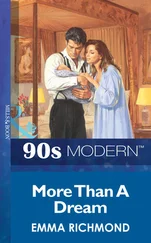Phoenix Langrish Phoenix Langrish A woman who made the world stand still. At eighteen she had been beautiful. At twenty-eight she was stunning. And she did something to Nash Vallender’s heart that no other woman had ever been capable of. Unaware of being watched, she closed the car door, and dropped the notebook she was carrying. Bending to pick it up, she dropped her bag, and as she straightened, the small camera she was carrying around her neck caught on the door handle. Still clumsy. Still so very lovable. She gave a husky little laugh, closed her eyes, took a deep breath, untangled the camera and turned. Never had a smile been wiped away so quickly, he thought as she glared at him in shock. “Hello, Phoenix.” He greeted her quietly, and his voice was husky, as husky as it had been all those years before.
Title Page One Bride Required! Emma Richmond www.millsandboon.co.uk
CHAPTER ONE CHAPTER TWO CHAPTER THREE CHAPTER FOUR CHAPTER FIVE CHAPTER SIX CHAPTER SEVEN CHAPTER EIGHT Copyright
Phoenix Langrish
A woman who made the world stand still.
At eighteen she had been beautiful. At twenty-eight she was stunning. And she did something to Nash Vallender’s heart that no other woman had ever been capable of.
Unaware of being watched, she closed the car door, and dropped the notebook she was carrying. Bending to pick it up, she dropped her bag, and as she straightened, the small camera she was carrying around her neck caught on the door handle. Still clumsy. Still so very lovable.
She gave a husky little laugh, closed her eyes, took a deep breath, untangled the camera and turned.
Never had a smile been wiped away so quickly, he thought as she glared at him in shock.
“Hello, Phoenix.” He greeted her quietly, and his voice was husky, as husky as it had been all those years before.
One Bride Required!
Emma Richmond
www.millsandboon.co.uk
CHAPTER ONE
NASH VALLENDER hadn’t known he was a hero, or not until quite recently, that was. Not, in fact, until he’d taken leave of his senses. Leaning on the sagging gate, his dark hair ruffled by the May breeze, grey eyes rueful, he stared at the derelict ruin in front of him.
Oddly Manor. Oddly named, oddly listing to one side, and, even more oddly, his. A distant aunt, one he barely remembered, had left it to him. Because he was brave. He hadn’t understood what the executor of her will had meant at the time. He did now. Not the bravery of fighting dragons, but of withstanding bombardment and sabotage. He’d been blitzed with letters and visits from the villagers begging him to keep and restore it. Driven nearly insane with the unwanted persistence of the developers to encourage him to offload it onto them as though he should be grateful for such generosity. The executors had made veiled references to the untold pressure put on his aunt to sell. In fact everyone, except the villagers, was of the same opinion. Get rid of it. Which he should have done.
He wasn’t philanthropic, he wasn’t a romantic, and he had certainly never overly concerned himself about the fate of the English countryside, but he did have a strong aversion to being pressurised. Which was why, having thwarted the developers’ dream of turning the land into an estate of mock Tudor homes, thus becoming a knight in shining armour to the villagers of Mincott Oddly, where his bequest stood, he was now standing in the May sunshine viewing his very own ruin and wondering what on earth he was going to do with it.
But if someone considered you brave, he thought with a small self-mocking smile, even if it was only a distant, barely remembered, now dead relative, there was somehow a compulsion not to prove them wrong. A compulsion that was going to prove very costly. Not only the renovation, but trying to find out who was so busily trying to destroy the house. Because someone was.
Windows were broken; slates fell from the roof with alarming regularity; small fires broke out due to defective wiring—or so he had been told. A coping stone had narrowly missed injuring one of the villagers who was keeping an eye on the place. The obvious contenders for the sabotage were, of course, the developers. But he had no proof. Which was why he had rung a private detective he’d used before and left a message on his answering machine. Hopefully he would get back to him some time soon.
He glanced sadly at the ivy that was slowly strangling the stonework, and the definitely sagging roof of the east wing. Although why it was called the east wing he had no idea. The whole house faced east. But that was what the executors had called it, and no doubt that was what it would remain. He really should have sold. Building land was at a premium again. He could have asked, and probably got, over two hundred thousand for it. He was one of the most respected businessmen in London, and he was behaving like a fool. Never in a million years would he have thought he’d want to hold onto a mouldering pile that was only good for knocking down. But it had ten acres. So did Nettlesham Swamp, he told himself with a grin, but that didn’t mean anyone in their right mind would want to keep it! And for a man who had taken on multinational corporations and won, taken on white-water rapids on nothing more substantial than a boat resembling a banana leaf, trying to persuade himself to look on it as a challenge, and not the white elephant it undoubtedly was, was even more foolish.
His friends thought him mad, including Mike, his architect, who was supposed to be looking over the property and who seemed to have disappeared. His enemies thought him a fool, but he didn’t explain and he didn’t try to justify himself—a policy that had stood him in good stead in the past. Whether it would stand him in good stead now, he didn’t know; he only knew that few people would ever understand why he had behaved as he had. But then, people very rarely understood him. Never understood the risks he took in business or in his leisure. He wasn’t entirely sure he understood them either. Just the way he was made, he supposed. And opposition always made him stubborn. In business that was sometimes a good thing, because his stubbornness was usually based on knowledge, insight, but in this instance his stubbornness was based on—what? A whim? No, because if the developers hadn’t come, hadn’t tried to pressurise him, he would probably have sold. And he would then never have had the perfect opportunity to meet someone he hadn’t seen in a very long time.
Glancing at his watch, he gave a rueful smile. He couldn’t remember the last time he had waited for someone with such expectation. How much had she changed? he wondered. How much had he changed?
Hearing a car, he stilled. Listening intently, he plotted the car’s movements by sound alone. He couldn’t see it, any more than the driver could see him, because of the high, untrimmed hedges, but if she parked where she’d been instructed to park... For a man of such courage, he mocked himself, he was feeling an odd reluctance to actually face her. Not that any of his thoughts showed on his face. They never did.
Lifting the gate in order to open it, he walked round the side of the house to stare at the small blue car that had just parked.
Ten years ago he and the woman inside that car had almost had an affair, but she’d been due to go up to university and he’d had the chance to go to the States, something he’d very much wanted to do. ‘Wrong time, wrong place,’ he’d told her gently. ‘Go and carve out your career.’ She hadn’t begged, pleaded, had just looked at him, then walked away. It hadn’t been easy to let her go, and a large part of him had always regretted it, and so, when the opportunity had come to see her again...
Fate? he wondered. Preordained? He had no idea, but just before he had learned of his bequest he’d seen an article about her, about house-detecting. About how she tried to discover the origins of old houses. When the Manor had come into his hands it had seemed the most natural thing in the world to write and ask her to come and see him.
Читать дальше












